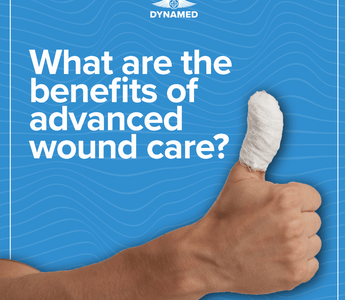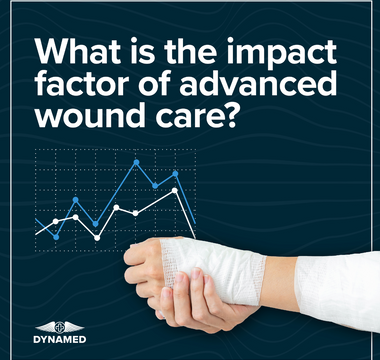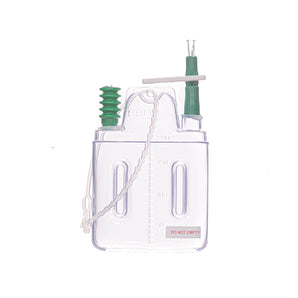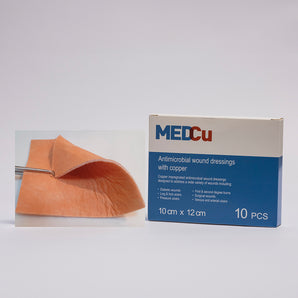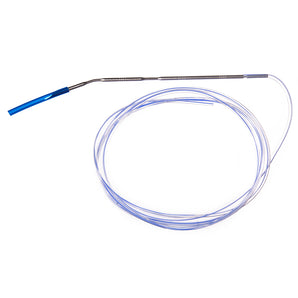Managing wounds effectively is vital for recovery, especially when dealing with complex or chronic injuries. Advanced wound care plays a crucial role in addressing wounds that don't heal with standard methods, offering tailored solutions to support the body's natural healing process. This approach not only reduces the risk of complications like infections but also promotes faster recovery and improved outcomes.
In environments where proper wound care is essential—be it hospitals, clinics, or pharmacies—advanced techniques help ensure patients receive the best possible treatment. By focusing on factors like infection control and optimised healing, advanced wound care enhances both patient comfort and overall health, making it an indispensable part of modern medical practice.
Key Takeaways
-
Advanced wound care accelerates healing by providing optimal environments for tissue regeneration and recovery.
-
It reduces the risk of infections through specialised dressings, such as antimicrobial solutions, ensuring safer and more effective wound management.
-
Chronic wounds, like diabetic ulcers and pressure sores, benefit significantly from tailored advanced care solutions, improving patient outcomes.
-
Advanced techniques prevent complications, including scarring and delayed healing, promoting better overall recovery experiences.
-
Innovative technologies like negative pressure wound therapy (NPWT) and hyperbaric oxygen therapy (HBOT) enhance healing for complex or non-healing wounds.
-
A multidisciplinary approach ensures personalised care and addresses underlying factors to optimise wound management and patient comfort.
Understanding Advanced Wound Care
Advanced wound care refers to specialised treatments and methods used to manage wounds that are complex, chronic, or fail to heal effectively with standard approaches. These solutions provide targeted care to improve healing outcomes and patient comfort.
What Is Advanced Wound Care?
Advanced wound care involves using innovative techniques and products, such as hydrogel dressings, calcium alginate dressings, and hydrocolloid solutions. These products offer optimal moisture balance, reduce risks of infections, and promote tissue repair. Unlike conventional options, advanced care addresses intricate wound challenges arising from factors like surgery, diabetes, or poor circulation.
We utilise these advanced wound care products to mitigate complications, improve recovery rates, and enhance patient satisfaction. This approach goes beyond surface healing, ensuring comprehensive care tailored to each wound's specific needs.

Why Is Advanced Wound Care Essential?
Managing wounds with advanced care ensures shorter recovery periods, reduced infection risks, and better outcomes. Chronic wounds, such as diabetic ulcers or pressure sores, require more than basic dressings. By incorporating advanced techniques, we equip healthcare providers with effective tools to treat wounds that would otherwise worsen.
In healthcare settings across Africa, the importance of advanced wound care stands out. Accessibility to modern wound care products streamlines treatments and supports healthcare providers in delivering excellent care. For instance, patients recovering from surgeries or injuries benefit significantly from antimicrobial dressings designed to foster a clean healing environment.
Integrating advanced technologies in wound care is an investment in healthier, faster recoveries for patients with diverse needs.
Benefits Of Advanced Wound Care
Advanced wound care offers numerous advantages for managing complex wounds effectively. By integrating specialised treatments and wound care products, we enhance patient outcomes and support diverse healthcare needs.
Faster Healing And Recovery
Advanced techniques accelerate the healing process. Modern wound care solutions, including hydrocolloid and alginate dressings, create optimal environments for tissue repair. These products maintain moisture balance, allowing cells to regenerate more efficiently and reducing the overall recovery time.
Reduced Risk Of Infections
Infection risk decreases with the use of advanced wound care systems. Antimicrobial dressings prevent harmful bacteria from entering wounds, protecting patients from complications. Proper infection control measures not only ensure safer recovery but also minimise hospital visits or extended care needs.
Improved Chronic Wound Management
Chronic wounds, such as those caused by diabetes or venous insufficiency, benefit significantly from advanced care. Tailored products, including foams and hydrogels, cater to different wound stages and conditions. By addressing key challenges like poor circulation or constant exudate management, we support effective healing for long-standing wounds.
Prevention Of Complications
Specialised wound care prevents complications, including scarring and delayed healing. Products like advanced occlusive dressings evenly close wounds, promoting better outcomes. Prevention directly impacts a patient’s quality of life by avoiding unnecessary discomfort and ensuring a smoother recovery process.
Our advanced wound care solutions meet critical healthcare needs by offering effective, versatile, and high-quality treatments that support healing across various stages and conditions.
Key Components Of Advanced Wound Care
Advanced wound care combines innovative products and tailored therapies to address complex and chronic wounds. It supports faster healing, minimises complications, and enhances patient outcomes through cutting-edge methodologies and specialised solutions.
Advanced Dressings And Therapies
Modern dressings are pivotal in advanced wound care. They provide optimal environments for tissue repair while addressing specific wound requirements:
-
Hydrogel Dressings: Ideal for dry wounds or those with necrotic tissue. These dressings offer hydration, soothe discomfort, and promote autolytic debridement, particularly useful for pressure ulcers or diabetic foot ulcers.
-
Calcium Alginate Dressings: Designed for moderate to heavy exudation, these dressings form a gel on contact with wound exudate, maintaining moisture while reducing the risk of infection. They're suitable for diabetic ulcers and surgical wounds.
-
Antimicrobial Dressings: Help control infection through effective bacterial management, protecting wounds at high risk of complications.
Specialised therapies such as negative pressure wound therapy (NPWT) further enhance wound healing by removing excess fluid and stimulating tissue growth.
Hyperbaric Oxygen Therapy (HBOT)
HBOT increases oxygen delivery to the wound site through a pressurised chamber. By using 100% oxygen, this therapy promotes tissue oxygenation, accelerates healing, and combats infections. It’s especially effective for non-healing wounds like diabetic foot ulcers, radiation-damaged tissues, or osteomyelitis. HBOT also supports new blood vessel formation, reduces swelling, and encourages healthy tissue regeneration.
Role Of Multidisciplinary Approaches
A comprehensive approach is essential in advanced wound care management. Physicians, nurses, dieticians, and specialists collaborate to address underlying factors like circulation, infection control, and nutrition. By combining expertise, we ensure personalised care, monitoring every stage to optimise healing and patient comfort. This coordinated effort is critical in treating wounds associated with chronic conditions or surgical recovery.
Conclusion
Advanced wound care represents a transformative approach to managing complex and chronic wounds. By combining innovative products with personalised therapies, it ensures faster healing, reduced complications, and improved patient comfort.
Through a multidisciplinary focus, this specialised care addresses underlying factors, promoting better outcomes for patients facing challenging wound conditions. It's a vital step forward in enhancing recovery and quality of life across diverse healthcare settings.
Visit Dynamed Pharmaceuticals
Phone: 0861 00 00 43
Website: dynamed.co.za
Email (Sales): sales@dynamed.co.za
Email (Info): info@dynamed.co.za
Google Maps: Find us here
Frequently Asked Questions
What is advanced wound care?
Advanced wound care refers to specialised treatments and products designed to address complex or chronic wounds. These solutions promote faster healing by providing an optimal environment for tissue repair. Advanced techniques include modern dressings like hydrogel and calcium alginate, antimicrobial protection, and therapies like negative pressure wound therapy (NPWT).
How does advanced wound care benefit patients?
Advanced wound care accelerates healing, reduces the risk of infection, and minimises complications. It tailors solutions to specific wounds, improving patient comfort and outcomes. It is highly effective for chronic wounds and helps prevent scarring, delayed healing, and the need for extended hospital stays.
What types of wounds need advanced care?
Wounds that are chronic, non-healing, or complex, such as diabetic ulcers, surgical wounds, or injuries caused by poor circulation, often require advanced care. These techniques address underlying issues to optimise healing and prevent complications.
What are some products used in advanced wound care?
Advanced wound care uses innovative dressings like hydrogel, calcium alginate, and antimicrobial solutions. These products create ideal conditions for tissue repair while preventing infection. Additional treatments include negative pressure wound therapy (NPWT) and hyperbaric oxygen therapy (HBOT).
How does advanced wound care prevent infections?
Antimicrobial dressings in advanced wound care reduce bacterial growth, lowering the risk of infections. These specialised treatments protect wounds from external contaminants and support faster, healthier healing by creating a clean healing environment.
Who provides advanced wound care?
Advanced wound care is typically managed by a multidisciplinary team, including doctors, nurses, and wound specialists. This collaborative approach ensures comprehensive care by addressing factors such as infection control, circulation, and nutrition.
Is advanced wound care suitable for chronic wounds?
Yes, advanced wound care is highly effective for chronic wounds. It provides tailored solutions at different healing stages, addressing underlying causes, improving tissue repair, and minimising the risk of long-term complications such as scarring.
Are advanced wound care treatments available in Africa?
Yes, advanced wound care treatments are increasingly available in Africa. Healthcare systems are adopting modern products and therapies to address chronic or complex wounds, improving patient outcomes and enhancing health across the region.

